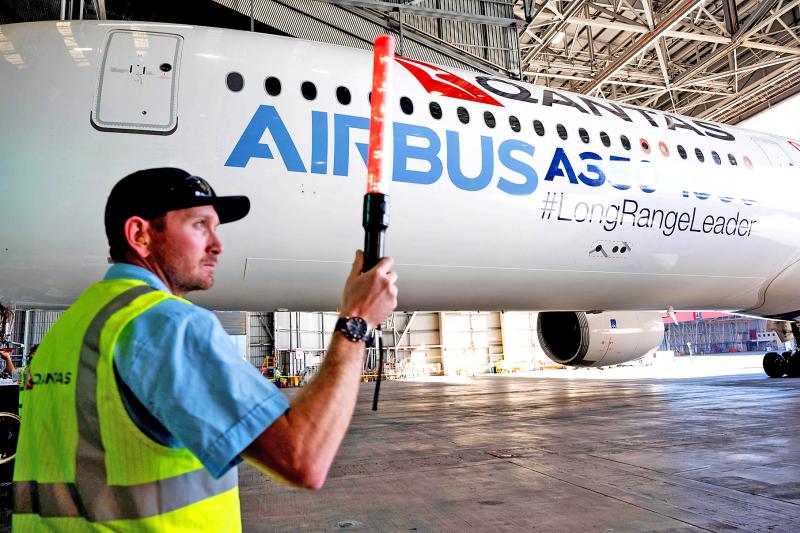Qantas Airways Ltd revived a plan to start direct flights connecting Australia’s east coast with New York and London, as it finally ordered Airbus SE jets for the ultra-long services.
The airline yesterday said that it is buying 12 A350-1000s that can fly non-stop from Australia to any city in the world, adding that commercial services are to start from Sydney in late 2025.
Qantas had planned to start the 20-hour flights — internally called Project Sunrise — next year, and was close to ordering the aircraft when COVID-19 decimated the aviation industry.

Photo: AFP
The resumption of the project signals the airline’s confidence in an international passenger rebound, as well as greater demand for flights with no stopovers.
Qantas said that demand on key routes to London, Los Angeles and Johannesburg already exceeds pre-pandemic levels.
“We’re finally seeing a sustained recovery in travel demand,” Qantas CEO Alan Joyce said.
Qantas’ A350s will be configured to carry 238 passengers in four classes — first, business, premium economy and economy. Most A350s carry more than 300 passengers. The planes are designed with an extra fuel tank to extend their range so they can fly the distances required.
In a post-pandemic world in which geopolitical tensions are also likely to increase, the ultra-long services should have a unique appeal as they bypass travel hubs, University of Sydney business professor Rico Merkert said, adding that flights will command higher fares and be more profitable for Qantas.
Qantas said the plane’s economy seats will have five more centimeters of legroom, although first-class cabins will come with a seat, a bed and a door.
More than 40 percent of the cabin is designed with premium seating, compared with about 30 percent in Qantas’ Boeing 787s and Airbus A380s. The new planes have “a wellbeing zone” in the middle where passengers can stretch or take a break.
The A350s are to be delivered to Qantas from 2025 until 2028.
A rebound in business air travel has been steeper than expected, demand from small businesses is above pre-COVID-19 levels and corporate travel is 85 percent recovered, Qantas said.
In the current quarter, Qantas’ domestic capacity is expected to be 105 percent of 2019 levels, with international capacity to be slightly less than 50 percent in the same period, rising to about 70 percent in the quarter starting July, it said.
Qantas also confirmed a domestic fleet order, announced in December, for 40 A321XLRs and A220 aircraft, as well as options for 94 more jets during at least a decade. Those aircraft are to replace the airline’s aging Boeing 737s and 717s.

MULTIFACETED: A task force has analyzed possible scenarios and created responses to assist domestic industries in dealing with US tariffs, the economics minister said The Executive Yuan is tomorrow to announce countermeasures to US President Donald Trump’s planned reciprocal tariffs, although the details of the plan would not be made public until Monday next week, Minister of Economic Affairs J.W. Kuo (郭智輝) said yesterday. The Cabinet established an economic and trade task force in November last year to deal with US trade and tariff related issues, Kuo told reporters outside the legislature in Taipei. The task force has been analyzing and evaluating all kinds of scenarios to identify suitable responses and determine how best to assist domestic industries in managing the effects of Trump’s tariffs, he

TIGHT-LIPPED: UMC said it had no merger plans at the moment, after Nikkei Asia reported that the firm and GlobalFoundries were considering restarting merger talks United Microelectronics Corp (UMC, 聯電), the world’s No. 4 contract chipmaker, yesterday launched a new US$5 billion 12-inch chip factory in Singapore as part of its latest effort to diversify its manufacturing footprint amid growing geopolitical risks. The new factory, adjacent to UMC’s existing Singapore fab in the Pasir Res Wafer Fab Park, is scheduled to enter volume production next year, utilizing mature 22-nanometer and 28-nanometer process technologies, UMC said in a statement. The company plans to invest US$5 billion during the first phase of the new fab, which would have an installed capacity of 30,000 12-inch wafers per month, it said. The

Taiwan’s official purchasing managers’ index (PMI) last month rose 0.2 percentage points to 54.2, in a second consecutive month of expansion, thanks to front-loading demand intended to avoid potential US tariff hikes, the Chung-Hua Institution for Economic Research (CIER, 中華經濟研究院) said yesterday. While short-term demand appeared robust, uncertainties rose due to US President Donald Trump’s unpredictable trade policy, CIER president Lien Hsien-ming (連賢明) told a news conference in Taipei. Taiwan’s economy this year would be characterized by high-level fluctuations and the volatility would be wilder than most expect, Lien said Demand for electronics, particularly semiconductors, continues to benefit from US technology giants’ effort

‘SWASTICAR’: Tesla CEO Elon Musk’s close association with Donald Trump has prompted opponents to brand him a ‘Nazi’ and resulted in a dramatic drop in sales Demonstrators descended on Tesla Inc dealerships across the US, and in Europe and Canada on Saturday to protest company chief Elon Musk, who has amassed extraordinary power as a top adviser to US President Donald Trump. Waving signs with messages such as “Musk is stealing our money” and “Reclaim our country,” the protests largely took place peacefully following fiery episodes of vandalism on Tesla vehicles, dealerships and other facilities in recent weeks that US officials have denounced as terrorism. Hundreds rallied on Saturday outside the Tesla dealership in Manhattan. Some blasted Musk, the world’s richest man, while others demanded the shuttering of his